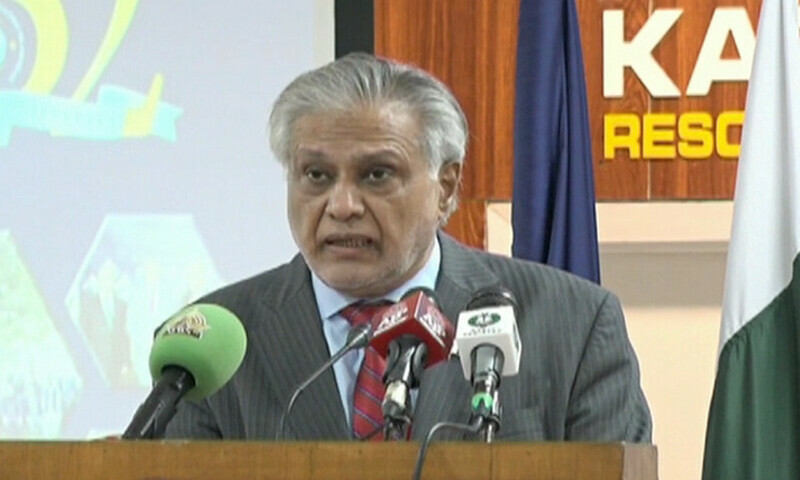Deputy Prime Minister and Foreign Minister Ishaq Dar on Monday stressed that Pakistan’s current foreign policy’s focus is on geo-economics, calling for the reimagination of regional cooperation within South Asia.
In recent months, Pakistan has increasingly sought to restore relations with neighbouring countries. On June 19, Pakistan, China and Bangladesh launched a trilateral cooperation mechanism, pledging to pursue “win-win cooperation” in what marked a subtle yet significant shift in South Asia’s strategic landscape. In recent months, Pakistan and Afghanistan have set out to restore their strained ties as Pakistan seeks to pursue a “secure and prosperous future” for itself, according to Dar.
Speaking at an event held to commemorate the 52nd anniversary of the Institute for Strategic Studies (ISSI), Dar stressed the significance of using foreign policy as a tool to promote the country’s economic interests, stating that enhancing trade, prompting foreign investment, attracting remittances and technology flows and forging development partnerships are among the highest priorities of the foreign ministry.
In South Asia, he noted that India’s “impulsive actions” have long thwarted the process of regional cooperation in the region and rendered SAARC dysfunctional.
The foreign minister stressed that the region instead “needs a positive lift for solidarity, mutually beneficial collaborations and shared prosperity”.
Reiterating Pakistan’s commitment towards economic diplomacy, Dar noted that Pakistan recently set up a trilateral mechanism with Bangladesh and China.
Bangladesh and Pakistan have historically shared strained relations.
He went on to say that “such interventions can be envisaged with other south asian nations as well, based on principles of common interest, mutual benefit, and win-win mutual cooperation”.
On improving relations with Afghanistan, the foreign minister recalled that Pakistan has devised a trilateral mechanism with Afghanistan with the cooperation of China, as the country seeks to “reset Pakistan and Afghanistan’s relationship on a positive trajectory”.
“Our visit to Kabul on April 19 and Pakistan, China and Afghanistan’s trilateral meeting in Beijing paved the way for a qualitative change,’ he stated, adding that Pakistan has agreed to extend CPEC to Afghanistan.
“Having made sincere efforts in Afghanistan’s interest, it is our legitimate expectation that the Afghan interim government would take all steps necessary to ensure that Afghanistan’s soil is not used for terrorism against any state, particularly Pakistan,” he added.
Dar stressed that he has always pushed for economic diplomacy.
Speaking about Pakistan’s long-standing strategic partnership with China, he said, “our all-weather strategic partnership continues to scale up to new heights”, while ties with the United States are “expanding both in scope and substance”.
“The relationship with Russia is growing into a partnership deemed vital by both sides, and we remain fruitfully engaged with the EU [European Union], Japan, and ASEAN,” Dar stated.
Pakistan is also forging collaboration with Turkiye, Saudi Arabia and the UAE in the Gulf region, he added.
Noting the shifting of the world order given recent geopolitical events, Dar reiterated Pakistan’s commitment to charting a “forward-looking course”.
Pakistan remains committed to safeguarding its sovereignty, territorial integrity and shouldering its obligations as a responsible member of the international community, he added.
On the matter of Indian aggression against Pakistan in May this year, the foreign minister pointed out that Pakistan gave a “quid pro quo plus” response — which is the “new normal” set by Pakistan if India insists on its dangerous notion of “limited war under the nuclear threshold”.
“The outcome of this four-day war has once again underscored the reality that India can neither intimidate nor coerce Pakistan,“Dar said, urging India to “rethink its present hubrisitic and misguided policies that threaten peace and undermine security in South Asia”.
Calling India’s move to hold the Indus Water treaty in abeyance illegal in the aftermath of the Pahalgam attack, he vowed that “Pakistan will continue to mobilise all international and legal forums to highlight India’s violation of international law”.
Reiterating Pakistan’s support for Kashmir, he stressed, “sustainable peace in South Asia remained contingent on a just and lasting solution of the Jammu and Kashmir dispute”.
The foreign minister also condemned the United States’ recent attacks on Iran’s nuclear facility in the 12-day war between Israel and Iran, calling it a “violation of international law and the UN charter”. He also condemned Israel’s actions in Gaza, terming it a “stain on the collective conscience of humanity”. He reiterated Pakistan’s call for the recognition of a Palestinian state.
